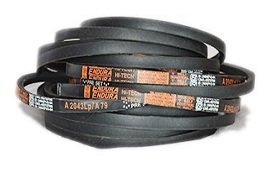
Endless V-belts tailored for industrial purposes, specifically designed to be fire-resistant and antistatic, play a crucial role in ensuring safety and reliability in environments where fire hazards and static electricity buildup are significant concerns. These V-belts are engineered using specialized materials and manufacturing processes to withstand high temperatures and resist ignition in the presence of flames or sparks. Additionally, they incorporate antistatic properties to dissipate static electricity, reducing the risk of electrostatic discharge and potential ignition sources in combustible atmospheres. Fire-resistant and antistatic V-belts are essential components in industries such as mining, petrochemicals, and manufacturing, where fire and explosion risks are prevalent. By providing dependable power transmission while mitigating fire and static electricity hazards, these V-belts contribute to maintaining operational safety, productivity, and regulatory compliance in industrial environments.
IS 2494 (Part 2):1993 is a crucial standard that helps in regulating the quality and safety of endless V-belts designed for industrial applications, focusing on fire resistance and antistatic properties. This standard serves as a critical guideline for manufacturers, specifying specific requirements for the design, construction, materials, dimensions, and performance characteristics of these specialized V-belts. Adhering to IS 2494 (Part 2):1993 ensures that manufacturers produce belts that meet stringent quality benchmarks, guaranteeing their ability to withstand fire hazards and dissipate static electricity effectively. Compliance with this standard not only ensures the smooth and reliable operation of industrial machinery in potentially hazardous environments but also promotes workplace safety by reducing the risk of fire accidents and electrostatic discharge-related incidents.
Note: Obtaining the ISI/BIS Certification is a mandatory requirement for manufacturers of V-Belts – Endless V-Belts for Industrial Purposes – fire resistant and antistatic V-Belts to sell their products in the Indian market.
In India, manufacturers are required to obtain ISI/BIS certification for their V-Belts, specifically Endless V-Belts designed for Industrial Purposes with fire-resistant and antistatic properties, to legally sell these products. This certification, mandated by Indian regulations, ensures compliance with specific quality and safety standards established by the BIS for the production and distribution of V-belts equipped with fire-resistant and antistatic features for industrial applications. Without this certification, manufacturers face legal repercussions and barriers in accessing the Indian market. Therefore, securing ISI/BIS certification is not only a regulatory necessity but also a crucial step for manufacturers to demonstrate the reliability, durability, and safety of their V-belts with specialized properties. This certification process underscores the importance of ensuring the integrity and performance of industrial equipment components, instilling confidence among stakeholders in the industrial sector regarding its compliance with Indian standards for usage and distribution.
Indian Standards Institute, or ISI was renamed the Bureau of Indian Standards (BIS) in 1987. The official mark that the Bureau of Indian Standards provides for manufacturers of various goods is the ISI Mark. It is used to indicate compliance with Indian standards (IS) set by the Bureau of Indian Standards (BIS) and has been used as a conformity marking for industrial products. Manufacturers received permission from BIS to use the ISI Mark on items that comply with relevant Indian requirements through the product certification program.
Only manufacturers (domestic or foreign) who produce the finished product will be awarded ISI Certification. This will not be given to any product importers, traders, dealers, or distributors.
The following documentation is required to get an ISI certification:
For more detailed information, please click here.
There are two approaches for Indian manufacturers to become certified with the ISI Mark:
Regular Procedure
With the possible exception of cases deemed "All India first," which might take up to 180 days, the licensing procedure is expected to be finished in 120 days. This timeline starts on the day the application is received, assuming that at different points in time the documentation, unit assessment, and product conformance are all deemed acceptable.
Step 1: Manufacturing Unit Customization in Compliance with Applicable Indian Standards
Step 2: Submission of the Application Form
For more detailed information, please click here.
Simplified Procedure
This is a much faster process than the standard procedure. After a factory inspection is deemed satisfactory and the initial evaluation establishes that the sample complies with the applicable Indian Standard(s), the license application process is expected to be finished in 30 days.
Step 1: Adapting the Manufacturing Unit to Comply with the Relevant Indian Standard
Step 2: Sample Testing
For more detailed information, please click here
The process of obtaining ISI Mark Certification for Foreign Manufacturers typically includes the following steps:
Step 1: Application
Step 2: Query Raised (If Any)
For more detailed information, please click here.
Brand Liaison provides helpful support for achieving ISI Mark Certification. Among our offerings are:
Please click here to get in contact with our team of specialists for a deeper explanation of the paperwork and steps needed to get ISI Mark Certification.